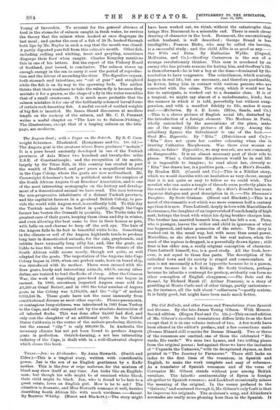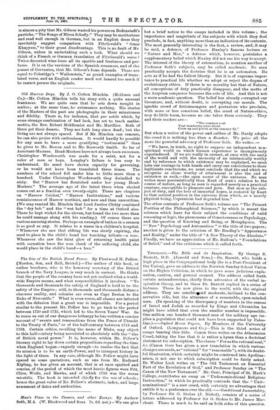The Cid Ballads, and other Poems and Translations from Spanish
and German. By the late James Young Gibson. With Memoir. Second edition. (Kegan Paul and Co. 12a.)—This second edition of Mr. Gibson's excellent translations differs little from the first except that it is in one volume instead of two. A few words have been altered in the editor's preface, and a few corrections made (Dumas Hinard still remains for Damas Hinard). Two or three of the romances are omitted, one of them the celebrated " Rio verde, Rio verde." We miss two hymns, and two trifling pieces from the original poems ; but against these we have the inclusion of " ITrganda the Unknown," with its decapitated rhymes, as first printed in " The Journey to Parnassus." There still lacks an index to the first lines of the romances, in Spanish and English, to make the work complete and easy of reference. As a translator of Spanish romances and of the verse of Cervantes Mr Gibson stands without peer among British versifiers. The falsetto sentimentality of Byron is foreign altogether to Spanish romance ; and Lockhart occasionally misses the meaning of the original. In the verses prefaced to the "Quixote," and scattered through it, Mr. Gibson's only fault is that he improves his originals. The muleteer's song, and Altisidora's serenades are really more pleasing here than in the Spanish. It is almost a pity that Mr. Gibson wasted his powers on Bodenstedt's pastiche, " The Songs of Mirza Schaffy." They may be meritorious and read well enough in German, but in an English dress they inevitably suggest comparison with FitzGerald's " Omar Khayyam," to their great disadvantage. This is no fault of Mr. Gibson, unless in undertaking such a task. What should we think of a French or German translation of FitzGerald's verse ? Twice-decanted wine loses all its sparkle and freshness and per- fume. It is on the versions of the Spanish romances, and of the poems of Cervantes, that Mr. Gibson's fame depends. These are equal to Coleridge's " Wallenstein," as grand examples of trans- lated verse, and an English reader need not lament too much if he cannot peruse the originals.



















































 Previous page
Previous page